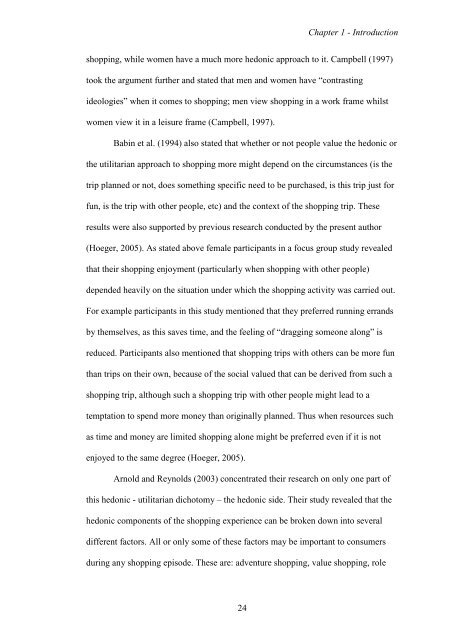CHAPTER 1 - University of Exeter
CHAPTER 1 - University of Exeter
CHAPTER 1 - University of Exeter
Create successful ePaper yourself
Turn your PDF publications into a flip-book with our unique Google optimized e-Paper software.
24<br />
Chapter 1 - Introduction<br />
shopping, while women have a much more hedonic approach to it. Campbell (1997)<br />
took the argument further and stated that men and women have “contrasting<br />
ideologies” when it comes to shopping; men view shopping in a work frame whilst<br />
women view it in a leisure frame (Campbell, 1997).<br />
Babin et al. (1994) also stated that whether or not people value the hedonic or<br />
the utilitarian approach to shopping more might depend on the circumstances (is the<br />
trip planned or not, does something specific need to be purchased, is this trip just for<br />
fun, is the trip with other people, etc) and the context <strong>of</strong> the shopping trip. These<br />
results were also supported by previous research conducted by the present author<br />
(Hoeger, 2005). As stated above female participants in a focus group study revealed<br />
that their shopping enjoyment (particularly when shopping with other people)<br />
depended heavily on the situation under which the shopping activity was carried out.<br />
For example participants in this study mentioned that they preferred running errands<br />
by themselves, as this saves time, and the feeling <strong>of</strong> “dragging someone along” is<br />
reduced. Participants also mentioned that shopping trips with others can be more fun<br />
than trips on their own, because <strong>of</strong> the social valued that can be derived from such a<br />
shopping trip, although such a shopping trip with other people might lead to a<br />
temptation to spend more money than originally planned. Thus when resources such<br />
as time and money are limited shopping alone might be preferred even if it is not<br />
enjoyed to the same degree (Hoeger, 2005).<br />
Arnold and Reynolds (2003) concentrated their research on only one part <strong>of</strong><br />
this hedonic - utilitarian dichotomy – the hedonic side. Their study revealed that the<br />
hedonic components <strong>of</strong> the shopping experience can be broken down into several<br />
different factors. All or only some <strong>of</strong> these factors may be important to consumers<br />
during any shopping episode. These are: adventure shopping, value shopping, role
















